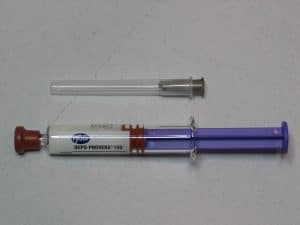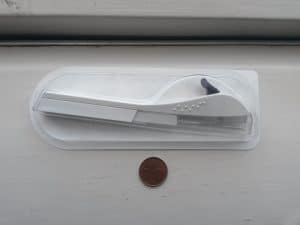Progesterone only hormonal contraception uses the female steroid hormone progesterone and is a very effective method of preventing pregnancy, more so than barrier contraception. In this article we will cover the main methods of progesterone only hormonal contraception, mechanisms of action and the advantages, disadvantages and contraindications for each method.
Progesterone Only Contraceptive Pills
The progesterone only contraceptive pill (POCP) doesn’t contain any oestrogen and has a different mechanism of action to the combined oral contraceptive. The POCP is especially used for women when the combined pill is contraindicated – e.g. in breast feeding mothers and patients with hypertension. There are five POCP’s currently licensed in the UK:
- Femulen® – etynodiol diacetate 500µg.
- Norgeston® – levonorgestrel 30µg.
- Noriday® – norethisterone 350µg.
- Micronor® – norethisterone 350µg.
- Cerazette® – desogestrel 75µg.
Mechanism of Action
The primary method of action in POCP’s is to thicken the cervical mucus due to the high levels of progesterone. This prevents the entry of sperm and thereby fertilisation of the oocyte. It also suppresses ovulation to varying degrees. It inhibits ovulation in about 60% of cycles with pills containing levonorgestrel whereas POCP’s containing desogestrel suppresses ovulation in 97% of cycles. The increased levels of progesterone also cause thinning of the endometrium which inhibits implantation.
Advantages
- More effective than barrier methods when taken correctly.
- Sex doesn’t need to be interrupted to use contraception.
- Can be used in many patients for whom the combined oral contraceptive is contraindicated.
- May reduce risk of endometrial cancer.
Disadvantages
- User dependent and has to be taken at the same time each day.
- Can produce irregular menstruation (4 in 10 women) or amenorrhoea (2 in 10 women).
- Some adverse affects, such as headaches, breast tenderness and skin changes, may be experienced when POCP’s are first started.
- 30% increased risk of ovarian cysts.
- Small increased risk of breast cancer.
Contraindications
- Current or past history of breast cancer.
- Liver cirrhosis or tumours.
- Lower efficacy in women over the weight of 70kg.
- Stroke or coronary heart disease.
Progesterone Only Implant
There is only one progesterone implant licensed for use in the UK which is Nexplanon®. It’s a small flexible tube about 40mm long which is inserted into the upper arm. The implant contains 68mg of etonogestrel (steroidal progestin) which is released into the systemic circulation for three years.
Mechanism of Action
The main mechanism of action of Nexplanon® is to inhibit ovulation. The increased levels of progesterone also cause thickening of cervical mucus which inhibits the passage of sperm. In addition, the high progesterone levels cause thinning of the endometrium which would prevent implantation if an egg were to be fertilised.
Advantages
- Extremely effective.
- Can be used in women for whom the combined oral contraceptive pill is contraindicated.
- Users don’t have to think about contraception for 3 years.
- Can be used when breastfeeding.
- Normal fertility returns as soon as implant is removed.
- Effective in women of all body mass (although earlier replacement recommended in women with high BMI).
- May reduce the risk of endometrial cancer.
Disadvantages
- About 50% of women experience changes in menstrual bleeding and bleeding patterns are likely to remain irregular.
- Fitting and removing the implant may cause some pain, bruising and irritation.
- Small increased risk of breast cancer.
- The implant can sometimes bend or break in situ.
Contraindications
- Pregnancy
- Unexplained vaginal bleeding
- Liver cirrhosis or tumours
- History of breast cancer
- Stroke or transient ischaemic attacks whilst using the implant
Progesterone Only Injectable Contraception
The progesterone only injectable contraceptive is a long lasting contraception where synthetic progesterone is slowly released into systemic circulation following intramuscular (IM) or subcutaneous injection. There are currently three available in the UK:
- Depo-Provera®– 150mg medroxyprogesterone acetate. This is the most commonly used progesterone only injectable and is licensed for long term use. It is given every 12 weeks by deep IM injection.
- SAYANA PRESS®– 104mg medroxyprogesterone acetate. This is also licensed for long term usage and is given every 13 weeks.
- Noristerat®– 200mg Norethisterone enantate. This is rarely used and is only licensed for short term use (two sets of injections). It’s given every 8 weeks by deep IM injection.

Fig 2. Depo-Provera® injection
Mechanism of Action
Progesterone only injectables prevent pregnancy by the inhibition of ovulation and the thickening of cervical mucus. The high progesterone also causes thinning of the endometrium making it unfavourable for implantation if fertilisation was to occur.
Advantages
- A very effective form of contraception.
- Users don’t have to think about contraception for as long as the injection lasts.
- No known interactions with any drugs.
- It can be used when combined hormonal contraceptives are not recommended such as in women with migraine and who are breast feeding.
- Can be used in women with a BMI < 35.
- May reduce the risk of endometrial cancer.
Disadvantages
- Not rapidly reversible – can take up to a year to return to normal fertility and menstruation can take several months to return to normal.
- Up to 50% of women stop usage within a year due to altered bleeding patterns including persistent bleeding.
- Increase in body weight, up to 2-3kg over a year.
- May be a slightly increased risk of breast cancer.
- Loss of bone mineral density with long term use (over a year of use), although there is no evidence that it increases the risk of fracture.
Contraindications
- Current Breast cancer (within 5 years)
- History of severe arterial disease or very high risk factors
- Pregnancy
- Diabetes with any vascular disease e.g. retinopathy
- People who will want to return to fertility in the near future
Effectiveness of Progesterone Only Contraceptive Methods
Failure rates of hormonal contraceptive methods are lower than those for barrier contraception. All values are expressed as the percentage of women who will get pregnant in one year using the particular method.
| Perfect Use | Typical Rate | |
| POP | 0.3 | 9 |
| Progesterone only implant | 0.05 | 0.05 |
| Progesterone only injectable | 0.2 | 6 |
Key Points to Consider
- Although hormonal contraception is extremely effective at preventing pregnancy it doesn’t protect against sexually transmitted infections so it’s important to counsel patients on safe sexual practices.
- With the progesterone only pill, it is important to explain to the patient what to do if they miss a pill and this can vary depending on the brand of POP.
- Detailed information can be found in the Faculty of Sexual & Reproductive Healthcare (FSRH) UK Medical Eligibility Criteria (MEC) guidelines.

